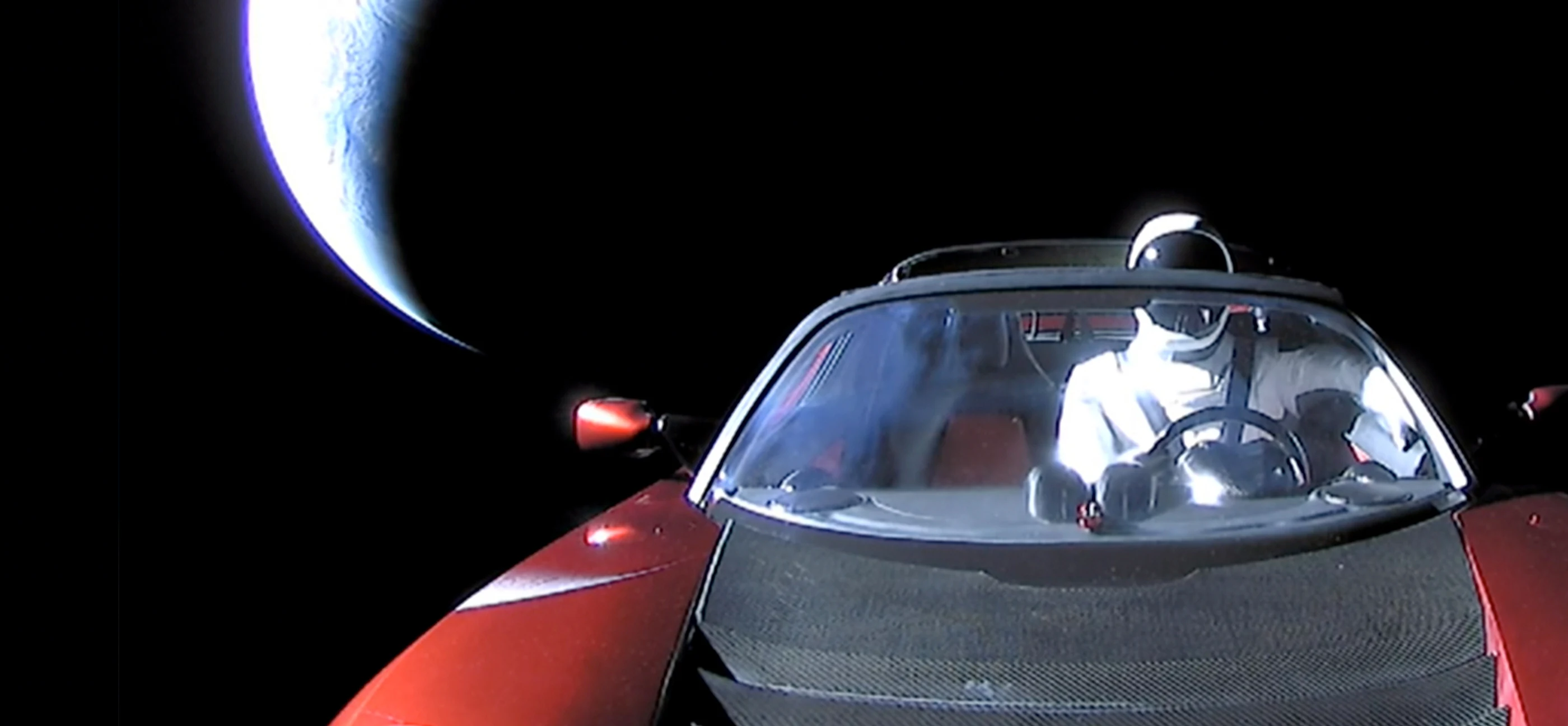
As entrepreneurial rocket companies come closer to shooting the first space tourist into the void, perhaps even this year, another reality is dawning: The business of space is no different than new industries everywhere else. It’s tough to launch.
Up until now, companies competing in the commercial space race have been blessed somewhat by the glamour of it all. Investors enthusiastically, maybe too much so, backed a host of startups including those headed by superstar names like Sir Richard Branson, Jeff Bezos, and Elon Musk. Rich adventurers are lining up with wallets out to be among the first star men and women. Better yet, companies such as SpaceX and Orbital ATK (now a division of Northrup Grumman) have actually proven their launch vehicles by delivering satellites or payloads to extraterrestrial destinations.
The latest news: Israel's nonprofit SpaceIL on February 21 is scheduled to launch the first private mission to land on the moon, using a SpaceX Falcon 9 rocket. The mission will use a lander to study the moon’s magnetic field.
One could imagine a trip like this becoming not exactly a rite of passage, but a spiritually significant kind of trip to take.
But the business reality is that we don’t really know if commercial space flight will ultimately be a money maker, how many competitors will fit in the market, or what demand will be for consumers taking off on space vacations after the initial enthusiasm wears off. Will this be a mass experience people want to be a part of, like owning an iPhone or watching a World Cup final?
“In some ways, that's the really interesting thing” about where human commercial space flights lead us, says Matthew Weinzierl, the Joseph and Jacqueline Elbling Professor of Business Administration at Harvard Business School. Weinzierl is also a research associate at the National Bureau of Economic Research, and studies tax policy and the economics of the commercial space sector.
Many potential problems can still sidetrack our trek to the stars: An accident above the earth, for example, could dampen demand quickly. Closer to the ground, investors could pull funding for a variety of reasons—not the least of which is the inconsistent pace with which human space travel has progressed following the shuttering of the Space Shuttle program by NASA in 2011.
Can entrepreneurs make a buck in space? We are about to find out.
The race is on
Commercial space ventures have received more than $18.4 billion of investment since 2000, according to the Start-Up Space 2018 report from research firm Bryce Space and Technology. Weinzierl says recent progress by two of the most well-funded companies—Virgin Galactic and Blue Origin—makes him more optimistic than in prior years about the future of human space exploration via non-government firms.
Mission Statement: VIRGIN GALACTIC“Our mission, to be the Spaceline for Earth, means we focus on using space for good while delivering an unparalleled customer experience.”
Virgin Galactic, founded by billionaire Branson, wants to sell short, suborbital flights, in which passengers get a taste of zero gravity and see the Earth’s curvature.
Virgin Galactic’s SpaceShipTwo commercial vehicle made its inaugural trip into space with two pilots in December 2018. Branson told Space.com that he hopes to take a suborbital trip on SpaceShipTwo in July 2019 to mark the 50th anniversary of the famed Apollo 11 launch to the moon.
“They've had a lot of setbacks over the last decade, so their having made that progress is important,” Weinzierl says.
Mission Statement: BLUE ORIGIN“Blue's vision is a future where millions of people are living and working in space. In order to preserve Earth, our home, for our grandchildren’s grandchildren, we must go to space to tap its unlimited resources and energy. If we can lower the cost of access to space with reusable launch vehicles, we can all enable this dynamic future for humanity.”
Meanwhile, Blue Origin, under the ownership of Bezos—Amazon CEO and richest man in the solar system—is also pursuing citizen astronaut flights on its New Shepard rocket and space capsule. Weinzierl suspects Blue Origin will be the first company to deliver on a civilian astronaut experience because of Bezos’ fortune and his longtime appetite for space exploration.
“He shows no signs of lagging in that passion, and just like with Amazon, he's intently focused on the experience of the customer.” Blue Origin is trying to sell tickets this year and fly either this year or 2020.
Mission Statement: SPACEX“SpaceX designs, manufactures and launches advanced rockets and spacecraft. The company was founded in 2002 to revolutionize space technology, with the ultimate goal of enabling people to live on other planets."
Other companies are also in the modern space race. Musk, the head of automaker Tesla, is behind SpaceX, which has developed the Falcon rocket and Dragon spacecraft. Dragon has already delivered cargo to the International Space Station, and SpaceX is finishing preparations to use the vehicle for commercial human flights, in its Crew Dragon version. Further along, Musk wants to land people on Mars.
Long-term NASA partner Boeing continues work on its CST-100 Starliner commercial orbiter, and the rocket manufacturer is collaborating with NASA on human commercial flights to the International Space Station. Boeing’s plans for tourism are less clear, but the company has expressed interest in extending its technology to private customers.
Weinzierl also points to two lesser-known companies that are deeply embedded in the development of space bases: Bigelow Aerospace and Axiom Space.
“Robert Bigelow is a discount hotel magnate who is obsessed with space, and he bought this old NASA technology for inflatable space habitats and has poured a ton of money into it,” Weinzierl says. One such inflatable pod is currently attached to the International Space Station and holding cargo. “Whether they can scale it to the size that they would want for a commercial space station or a hotel is unclear, but they have achieved a lot already.”
Axiom is focused on building commercial space stations, “but you can easily imagine that's the kind of destination we might eventually be sending people to,” Weinzierl says.
Space travel is inherently dangerous—18 astronauts and cosmonauts have died during spaceflight as of 2018. Accidents can set a company’s program back months or years. One of Virgin Galactic’s test pilots died during a flight mishap in 2014, and a SpaceX vehicle exploded on the launch pad in 2016 during fueling.
From a business perspective, such incidents raise a question of how risk-averse space exploration companies will want to be, Weinzierl says.
“Because we've had mostly government astronauts, the policy has been that there is zero tolerance for fatalities. And, of course, that doesn't mean we haven't had them, but that's the goal,” he says. “So, is that policy going to get transferred over to the private sector? Or is the private sector going to be able to operate more like high-risk adventure activities, where the individuals are able to sign away a lot of risk or a lot of liability before they take off? I assume [citizen astronauts] will have to sign something that says, ‘You can't sue me.’”
Will investors be patient?
Another obstacle that human space travel must avoid: Venture capital money suddenly drying up if there is a perception that space flights are not launching quickly enough.
“There is a real possibility—and I've heard more rumblings of this than I used to from people inside the sector—that there's a bit of an [investment] bubble, and people have gotten a little bit ahead of themselves on some of this stuff.”
If the bankrollers or the public weary of waiting, the starry-eyed appeal of humans going into space can wear off. “It's easy for the exciting stories to get told without the caveat that this is super hard, it takes a long time and there's a lot of uncertainty,” he says.
“There's a bit of a chance given some of the early successes of SpaceX and Blue Origin, that if people don't see results from them really quick, it's going to seem really disappointing,” Weinzierl says. “And people in the industry don't want that to be the message. I think they want the message to be that this is hard, we'll just keep working on it, and eventually we'll get there.”
It’s also possible that optimism will eclipse concerns about slow progress and instead lead to the intersection of popular culture and commercial space flights. “Every astronaut who's been in space describes how, in essence, their whole view of what it means to be on Earth and to be a person changes when you see the Earth from that perspective,” Weinzierl says. This is the Overview Effect described by author Frank White in 1987.
“One could imagine a trip like this becoming not exactly a rite of passage, but a … spiritually significant kind of trip to take.”
Taking that idea a parsec further, if people start living in space colonies, the cultural transformation will be significant. “People will start to think of it as another branch of civilization,” he says.
Space Sidebar
Commercial human space travel is regulated by the Federal Aviation Administration. If a space company wants to launch a vehicle in the United States, it must obtain a license from the FAA’s Office of Commercial Space Transportation.
For certain launches, the FAA reroutes commercial airplane traffic around a spacecraft’s trajectory. For example, the Washington Post reported that when SpaceX launched a large rocket in February 2018, the FAA cleared a 1,300-mile area of airspace from the East Coast into the Atlantic Ocean, forcing planes to avoid the flight path of the space vehicle.
Scott Wallask is a journalist based in the Boston area.
Image: SpaceX
Related Reading:
The Space Shuttle Columbia’s Final Mission
Who Owns Space?
Mission to Mars: It Really Is Rocket Science
What do you think of this research?
Are you thrilled or chilled about the prospect of space tourism? Is it a business? Share your insights below.
